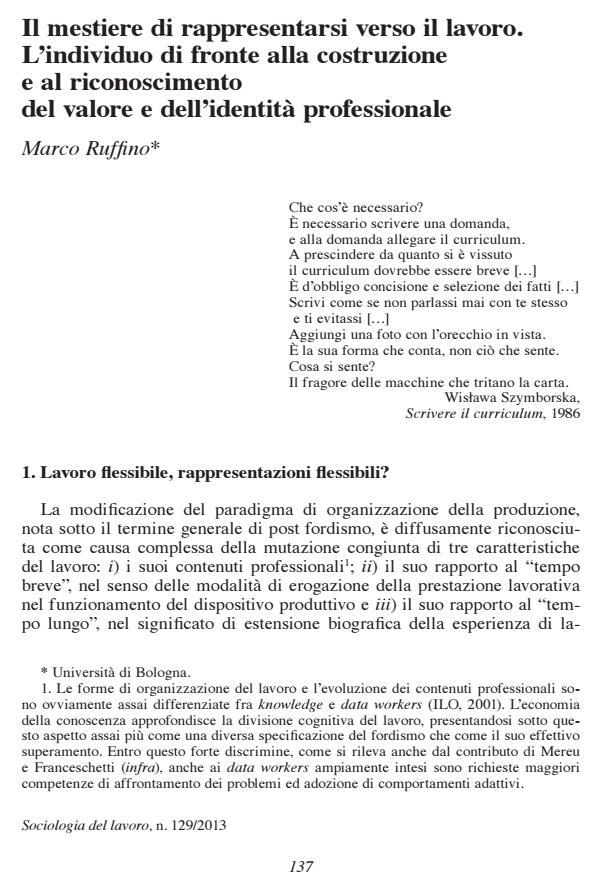The job to represent oneself towards the work. The individual facing the building and the recognition of the professional value and identity
Journal title SOCIOLOGIA DEL LAVORO
Author/s Marco Ruffino
Publishing Year 2013 Issue 2013/129
Language Italian Pages 20 P. 137-156 File size 306 KB
DOI 10.3280/SL2013-129009
DOI is like a bar code for intellectual property: to have more infomation
click here
Below, you can see the article first page
If you want to buy this article in PDF format, you can do it, following the instructions to buy download credits

FrancoAngeli is member of Publishers International Linking Association, Inc (PILA), a not-for-profit association which run the CrossRef service enabling links to and from online scholarly content.
The paper discuss the work representations, moving from the perspective of the individual involved in a job or looking for it. The thesis consists of three arguments: the work representation is changing from the specification of a clear position in the professional space to the "convenient reshaping" of the individual experience gained by the formal, non formal and informal learning; the individual is committed, at the same time, in two different representation processes, respectively related to the identity toward the work and to the competencies set owned, sees as a non-contextual and plural resources. This double exercise may cause critical consequences in the relations between the "to be" (as a social identity) and the "to have" (reusable competencies) dimensions; the representation capability toward the work has to be seen as a professional core component and a key bargaining resource in the labour market. In specific, the meta-cognitive aspects are gaining a clear centrality. This process is not neutral in terms of real rights, leading a more incisive individualization of inequality, especially for the individuals with poor capabilities. To conclude, the author stress the opportunity to redirect the sociological and political attention from the "representation" in itself (as a protocol signalling the position toward the work) to the "representing" (in the meaning of key process co-constructive between individual and society, with a correlative suite of rights, duties and functionings). This implies to rethink active welfare schemes and the role of the institutions, in the capabilities perspective.
Keywords: Work representations, individualization, competencies, cognitive biography, professional standards, certification
Marco Ruffino, Il mestiere di rappresentarsi verso il lavoro. L’individuo di fronte alla costruzione e al riconoscimento del valore e dell’identità professionale in "SOCIOLOGIA DEL LAVORO " 129/2013, pp 137-156, DOI: 10.3280/SL2013-129009